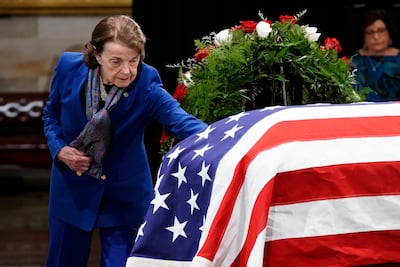Dianne Feinstein, a long-serving Democratic US senator from California and gun-control advocate who spearheaded the first federal assault-weapons ban and documented the CIA's torture of foreign terrorism suspects, has died. She was 90.
Feinstein was well known as a Washington trailblazer who, among other accomplishments, became the first woman to head the influential Senate Intelligence Committee.
President Joe Biden paid tribute to his “cherished friend” and skilful legislator.
“Dianne made her mark on everything from national security to the environment to protecting civil liberties. She’s made history in so many ways, and our country will benefit from her legacy for generations,” Mr Biden said.
“Often the only woman in the room, Dianne was a role model for so many Americans.”
Her office said she died on Thursday night at her Washington home. She cast her last vote in the US Senate earlier that day.
“There are few women who can be called senator, chairman, mayor, wife, mom and grandmother. Senator Feinstein was a force of nature who made an incredible impact on our country and her home state,” said Feinstein's chief of staff, James Sauls.
Speculation about Feinstein's health, particularly her cognitive abilities, had been swirling for months and earlier this year she announced she would not be seeking another term in 2024.
In a message of condolence, former secretary of state Hillary Clinton paid tribute to Feinstein's pioneering role for women in politics.
“She blazed trails for women in politics and found a life's calling in public service,” Ms Clinton said.
Feinstein's death does not mean the Democrats lose control of the closely divided US Senate, because California Governor Gavin Newsom can appoint someone to temporarily fill her seat until the next election. California votes overwhelmingly Democrat so her elected replacement will almost certainly be a Democrat.
Mr Newsom paid tribute to a “political giant” who smashed glass ceilings and fought for her country.
During almost 31 years in the Senate she amassed a moderate-to-liberal record, sometimes drawing scorn from the left. Feinstein joined the Senate in 1992 after winning a special election and was re-elected five times including in 2018, along the way becoming the longest-serving woman senator in history.
She was elected to the San Francisco Board of Supervisors in 1969 and became its first female president in 1978, the same year Mayor George Moscone was gunned down alongside Supervisor Harvey Milk at City Hall by Dan White, a disgruntled former supervisor. Feinstein found Milk’s body.
After Moscone’s death, Feinstein became San Francisco's first female mayor. In the Senate, she was one of California’s first two female senators, the first woman to head the Senate Intelligence Committee and the first woman to serve as the Judiciary committee’s top Democrat.
Legislatively, Feinstein was best known as the lead author of the 1994 law that banned the manufacture of certain types of semi-automatic firearms – “assault weapons”, in the language of the legislation – and large-capacity magazines.
That ban expired in 2004 without action by Congress to renew it. In the years after, Feinstein tried without success to move a new version through Congress.
Although Feinstein was not always embraced by the feminist movement, her experiences coloured her outlook through her five decades in politics.
“I recognise that women have had to fight for everything they have, every right,” she told the Associated Press in 2005, as the Judiciary Committee prepared to hold hearings on President George W Bush's nomination of John Roberts to replace Sandra Day O'Connor on the Supreme Court.
“So I must tell you, I try to look out for women's rights. I also try to solve problems as I perceive them, with legislation, and reaching out where I can, and working across the aisle,” she said.
Her tendency for bipartisanship helped her notch legislative wins throughout her career. But it also proved a liability in her later years in Congress, as her state became more liberal and as the Senate and the electorate became increasingly polarised.


